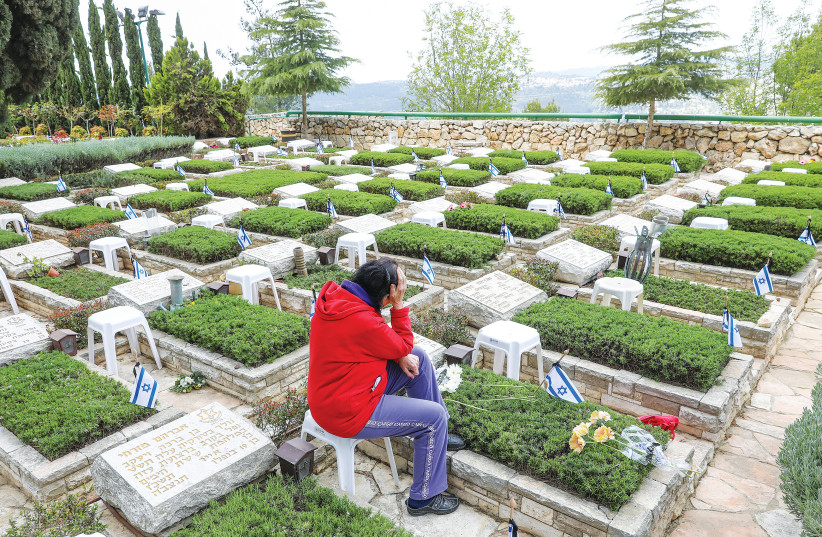Leading into Remembrance Day, Miri Menachem, the head of a special unit in the Defense Ministry, recently interviewed with The Jerusalem Post regarding providing monetary, emotional and logistical support to overseas families of fallen soldiers.
According to Menachem, the ministry’s Family and International Connections Unit serves almost 3,000 families of fallen soldiers overseas. In fact, she said there are almost no countries that do not have at least one fallen family member.
A lone soldier may have joined the army and fallen in circumstances where his family never even resided in Israel. This means, she said, that the overseas families of the fallen are a very diverse group.
“We remain in touch with them throughout the decades and passage of time. We embrace them, especially on Remembrance Day. Besides that there are many actions we take to continue to embrace them and show our commitment,” she said.
“We remain in touch with them throughout the decades and passage of time. We embrace them, especially on Remembrance Day. Besides that there are many actions we take to continue to embrace them and show our commitment.”
Miri Menachem
Menachem acknowledged that, “It’s not the same as a family where we can host them in a local district office in Israel,” but said that the solution has been that, “We have a representative at every consulate and embassy all over the world.”

This means that regardless of whichever foreign country the family lives in, “They have someone to go to. Then directives for how to handle things go through Israel. For example, the New York office receives the family members, but they get guidance from us. Then they are sent compensation payments, and support payments and get provided psychological treatment. Anything which families get in Israel, they will receive if they reside overseas.”
Menachem noted that in some cases, the psychological support could be remotely by Zoom or Skype, but that one way or another, the ministry works creatively to provide whatever emotional support is needed.
Bringing families to Israel for Remembrance Day
Another example of special services includes Israel physically “bringing our families to Israel every year around Remembrance Day. Parents, orphans, siblings and widows come to memorial ceremonies.”
Next, she stated that the State funds these family members for six days in a hotel, which is true even if the family member was killed 50 years earlier. There is no time limitation on providing support to immediate relatives, though for siblings the full yearly state-sponsored trip is only until age 18. From age 18, for siblings, the support for a ticket is once every five years.
Also, if there are two fallen family members within the same family, the ministry sponsors tickets for traveling to Israel separately for each of them, whether for Remembrance Day or the anniversary of their falling, which she called “the Holy of Holies” in a reference to the biblical inner chamber of the Holy Jewish Temple.
Further, she explained that the ministry has 150 employees working on the foreign fallen families issue for them, some of who are full-time and are solely with the defense ministry, but some of who also work for the Foreign Ministry.
Where there is a country with hundreds of families, full-time representatives are needed, whereas in countries with fewer families, one part-time representative can be sufficient to respond to their needs.
For those who are too ill or otherwise unable to physically travel to Israel for Remembrance Day, even if the country offers to pay for their ticket, the ministry makes sure to send a link to the family so they can follow by live stream.
Last year, the ministry brought then-defense minister Benny Gantz to Miami for a ceremony with approximately 120 families and a variety of dignitaries. Next, Gantz went to the 5th Avenue Synagogue in New York as well as to the Israel Day Parade to meet even more families for a major event with the mayor of New York and other dignitaries.
Moreover, she recounted a story of one father of a fallen soldier, whose son was killed at age 20. The mother of the soldier was a non-Jewish woman and the State still brought her along with the father to honor the soldier’s memory.
There are other stories about the ministry finding out by happenstance that a foreign family member had certain rights that they had not exercised, and then the ministry went out of its way to prove the issue so that they could grant the person all of the standard support.
In another story, an individual named Mickey Goldstein, with a fallen brother, made aliyah in his 90s. Menachem said “it’s very emotional when one talks to him and hears the story of how his brother died.”
She concluded that, “No other country does what Israel does in this area.”
